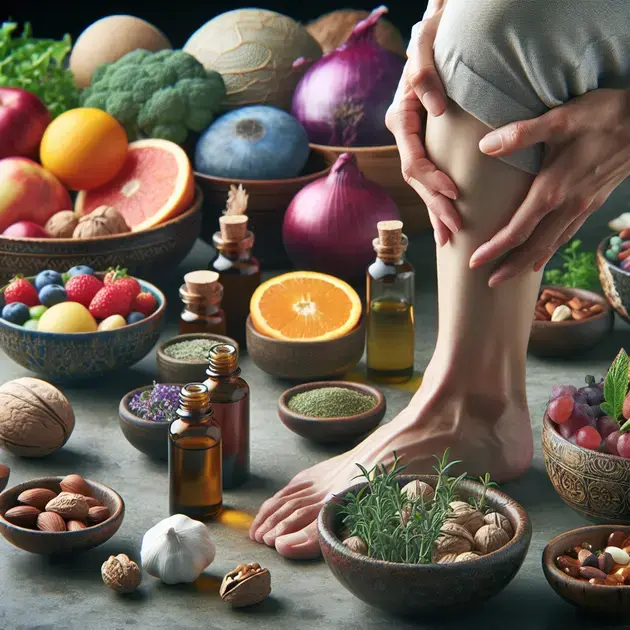Are you suffering from knee inflammation and looking for natural ways to soothe the pain? You’re not alone. Knee inflammation can be caused by a variety of factors such as overuse, injury, or underlying conditions like arthritis. Fortunately, there are several natural remedies that can help alleviate the discomfort and reduce swelling in your knees.
From incorporating anti-inflammatory foods into your diet to practicing gentle knee exercises and using cold therapy, there are plenty of simple and effective strategies you can try at home to ease knee inflammation without relying on medication. In this post, we will explore some of the best natural remedies to soothe knee inflammation and improve your overall knee health.

Natural Ways to Reduce Knee Inflammation Holistically
When it comes to reducing knee inflammation holistically, there are several natural remedies and approaches you can apply. One effective method is to incorporate anti-inflammatory foods into your diet, such as turmeric, ginger, and leafy greens. These foods can help reduce inflammation in the body, including the knees.
Another natural way to reduce knee inflammation is through the use of essential oils. Essential oils like peppermint, lavender, and eucalyptus have anti-inflammatory properties that can help alleviate knee pain and swelling. You can apply these oils topically or use them in a diffuser for aromatherapy benefits.
Additionally, practicing mindfulness techniques such as meditation and deep breathing exercises can help reduce stress levels, which can in turn decrease inflammation in the body, including the knees. Apps like Headspace and Calm offer guided meditation sessions that can be beneficial for overall health and well-being.
Regular exercise, particularly low-impact activities like yoga and swimming, can also help reduce knee inflammation. These exercises help strengthen the muscles around the knee joint, providing support and reducing strain on the knees. Apps like Yoga Studio and MySwimPro offer guided yoga and swimming workouts that are gentle on the joints.
By combining these natural approaches and making lifestyle changes, you can effectively reduce knee inflammation holistically and improve overall knee health without relying solely on medication or invasive treatments.
The Power of Anti-Inflammatory Foods for Knee Health
Anti-inflammatory foods play a crucial role in maintaining knee health and reducing inflammation in the body. Including foods rich in omega-3 fatty acids, such as salmon, flaxseeds, and walnuts, can help decrease inflammation and promote overall joint health.
Turmeric, a yellow spice commonly used in Indian cuisine, has been found to have powerful anti-inflammatory properties. Adding turmeric to your meals or taking a turmeric supplement can help reduce knee inflammation and alleviate pain.
Green leafy vegetables like spinach, kale, and broccoli are also excellent choices for combating inflammation and supporting knee health. These vegetables are rich in antioxidants and nutrients that can help reduce oxidative stress in the body.
Incorporating fruits like berries, oranges, and pineapple into your diet can also provide anti-inflammatory benefits for your knees. These fruits are high in vitamin C and other antioxidants that help reduce inflammation and promote tissue repair.
By focusing on a diet rich in anti-inflammatory foods and avoiding processed and sugary items, you can significantly improve knee health and reduce inflammation in a natural and sustainable way.
Gentle Exercises and Home Therapies for Knee Pain
When dealing with knee pain, incorporating gentle exercises and home therapies can be beneficial in reducing discomfort and improving mobility. One effective exercise for knee pain is the straight leg raise, which helps strengthen the quadriceps muscles and provides support to the knee joint.
Another gentle exercise option is water aerobics or swimming, which allows for low-impact movement and provides relief for painful knees. Swimming can help improve flexibility, strength, and cardiovascular health without putting excessive stress on the knees.
Using hot and cold therapy at home can also help alleviate knee pain and reduce inflammation. Applying a cold compress to the knee for 15-20 minutes at a time can help decrease swelling, while using a heating pad or warm towel can help relax the muscles and improve blood circulation.
Incorporating foam rolling into your routine can also effectively reduce knee pain and tightness. Foam rolling helps release muscle tension and improve flexibility in the legs, which can alleviate pressure on the knees during movement.
By combining these gentle exercises and home therapies, you can effectively manage knee pain, reduce inflammation, and improve overall knee function without the need for invasive treatments or medications.

**
How to Alleviate Knee Inflammation with Herbal Remedies**
Are you looking for natural ways to alleviate knee inflammation? Herbal remedies can be a great option to help soothe discomfort and reduce swelling in your knees. One effective herbal remedy for knee inflammation is turmeric. This powerful spice has anti-inflammatory properties that can help ease pain and swelling in the knees. You can incorporate turmeric into your diet by adding it to your meals or taking it as a supplement.
Ginger is another herb that can be beneficial for alleviating knee inflammation. Ginger has been used for centuries for its anti-inflammatory properties and may help reduce pain and swelling in the knees. You can enjoy ginger tea or add fresh ginger to your recipes to experience its benefits.
Boswellia is an herb that comes from the Boswellia serrata tree and has been traditionally used in Ayurvedic medicine to reduce inflammation. Boswellia extract may help alleviate knee pain and swelling by inhibiting inflammatory compounds in the body. You can find Boswellia supplements in health food stores or online.
Another herbal remedy to consider for knee inflammation is devil’s claw. Devil’s claw is a plant native to southern Africa and has been used to reduce pain and inflammation. Devil’s claw may help alleviate knee discomfort and improve mobility. You can take devil’s claw supplements in capsule form or drink it as a tea.
Overall, incorporating these herbal remedies into your daily routine may help alleviate knee inflammation and promote better joint health. Remember to consult with a healthcare professional before starting any new herbal remedies, especially if you are taking medications or have underlying health conditions.
**
Mind-Body Techniques for Easing Knee Inflammation**
When dealing with knee inflammation, incorporating mind-body techniques can be beneficial in managing pain and promoting healing. One effective technique is mindfulness meditation, which involves focusing your attention on the present moment without judgment. Mindfulness meditation can help reduce stress, which may contribute to inflammation in the body.
Yoga is another mind-body practice that can help ease knee inflammation. Gentle yoga poses can improve flexibility, strength, and circulation in the knees, leading to reduced pain and swelling. Practicing yoga regularly can also help reduce stress and promote overall well-being.
Acupuncture is a traditional Chinese medicine practice that involves inserting thin needles into specific points on the body to promote healing and relieve pain. Acupuncture may help alleviate knee inflammation by stimulating the body’s natural pain-relieving mechanisms and reducing inflammation.
Guided imagery is a mind-body technique that involves using visualization and imagination to promote relaxation and healing. By visualizing your knees as healthy and pain-free, you can help reduce inflammation and discomfort. Guided imagery can be done on your own or with the guidance of a trained professional.
By incorporating these mind-body techniques into your daily routine, you can effectively ease knee inflammation and promote overall joint health. Remember to listen to your body and consult with a healthcare provider before starting any new practices, especially if you have existing knee conditions.
**
The Role of Essential Oils in Calming Knee Inflammation**
Essential oils are concentrated plant extracts that have been used for centuries for their medicinal properties. When it comes to calming knee inflammation, certain essential oils can be beneficial in reducing pain and swelling. One popular essential oil for knee inflammation is eucalyptus oil. Eucalyptus oil has anti-inflammatory and analgesic properties, which can help alleviate knee discomfort and improve mobility.
Lavender oil is another essential oil that may help calm knee inflammation. Lavender oil is known for its relaxing and soothing properties, which can help reduce pain and inflammation in the knees. You can dilute lavender oil with a carrier oil and massage it into your knees for relief.
Peppermint oil is a cooling essential oil that can provide relief from knee inflammation. Peppermint oil has a refreshing effect and may help reduce swelling and discomfort in the knees. You can mix peppermint oil with coconut oil and apply it to your knees for a cooling sensation.
Chamomile oil is a gentle essential oil that can help calm knee inflammation and promote relaxation. Chamomile oil has anti-inflammatory properties that can help reduce pain and swelling in the knees. You can add a few drops of chamomile oil to a warm bath or mix it with a carrier oil for a soothing knee massage.
By incorporating these essential oils into your daily routine, you can help calm knee inflammation and promote better joint health. Remember to perform a patch test before using essential oils topically and consult with a healthcare professional if you have any concerns or sensitivities.
**
Conclusion
**
Herbal Remedies:
Exploring natural remedies like turmeric, ginger, Boswellia, and devil’s claw can significantly alleviate knee inflammation and improve joint health. These herbal options, with their anti-inflammatory properties and traditional uses, offer a holistic approach to managing knee discomfort.
Mind-Body Techniques:
Incorporating mindfulness meditation, yoga, acupuncture, and guided imagery into your routine can be instrumental in easing knee inflammation. These techniques not only help manage pain but also promote overall well-being by reducing stress and enhancing flexibility and circulation.
Essential Oils:
Utilizing essential oils such as eucalyptus, lavender, peppermint, and chamomile can provide a soothing effect on knee inflammation. Their anti-inflammatory and calming properties offer a natural way to reduce pain and swelling, promoting better joint health in the process.